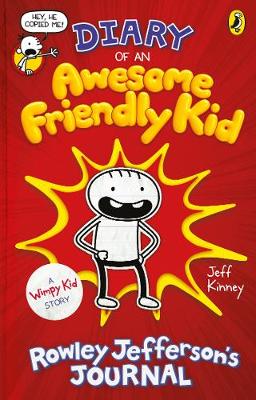
 Diary of an Awesome Friendly Kid Activity Sheet
Diary of an Awesome Friendly Kid Activity Sheet
Chatterbooks in Lockdown
Back to Children Home | Back to Books and Reading | Back to Chatterbooks in Lockdown
 Hopefully you enjoyed the book.
But how well did you read it? See if you answer these questions:
Hopefully you enjoyed the book.
But how well did you read it? See if you answer these questions:
Request a copy of Diary of an Awesome Friendly Kid using Arena the online library catalogue.
- Where did the wording of the title of this book come from?
- Why does Greg think Rowley should write a biography of him?
- Why was it a problem for Rowley to write about Greg’s “early life”?
- On the first sleepover, why did Rowley have to go home early?
- Who was “Bampy”?
- What did Rowley do to Greg when he mistook him for a burglar?
- What chore did Rowley do to get his first ‘Good Boy’ award?
- Where do Rowley and Greg study for the Maths test? Are they good study partners?
- What does Greg say that persuades Mr Hardy to give Rowley a better grade than the rest of the class?
- What is the punchline the boys used in the comics they made in Year 1 at Middle School?
- Greg sometimes chased Rowley with what creature?
- What is the name of the superhero created by Rowley and what was his superpower?
- How did Greg divide his room in half to keep Rowley on his own side?
- Who was Rowley’s favourite teacher?
- Despite all that Greg does to Rowley in the book, and his admission that they do get on each other’s nerves, what does he end the book stating that he and Greg are?
The Nature of Friendship
From your reading of the book, can you describe the friendship of Greg and Rowley? Consider:
- Is it and equal friendship?
- Could you really say that Greg is a good friend to Rowley?
- Why is Rowley always kind to Greg despite everything?
- Does Greg take advantage of Rowley’s kind nature?
- Who is right – Rowley who repeatedly says Greg is his best friend or His dad who says he does not like Greg?
- What sort of friend are you? Like Greg or like Rowley?
- Can you write a diary entry in the style of “Diary of an Awesome Friendly Kid” which gives a truer (less kind) reaction to something Greg has done?
Books Written Using a Diary Focus
The diary format is often used in books for both for children and adults. In recent years, diary style books have repeatedly topped the children’s bestseller lists, with many different styles of diaries on the shelves, some fictional, some real life. Here are a few you may recognise and maybe even read:
- “The Diary of a Young Girl” – Anne Frank
- “The Secret Diary of Adrian Mole” – Sue Townsend
- “Dork Diaries” – Rachel Renee Russell
- The Tom Gates series by Liz Pichon
- And of course, “Diary of a Wimpy Kid” – Jeff Kinney
If you have read any books in diary form, did you enjoy them? Did you find prose written in this way changed your reading experience?
Children’s writer, Jacqueline Wilson uses the fictional diary method in her “Tracy Beaker” book. She says, “it helps make the story more immediate and easy to read”. Would you agree?
While reading books in diary form is very popular, the number of children who actually write a diary themselves has fallen in the last few years (which is a shame because according to
the ‘National Literacy Trust’ there are great educational benefits to be had from writing a diary.) Social media and blogging have to an extent replaced traditional diary writing...and many
of you would probably say you were just too busy to write a diary...until now!
The Coronavirus lockdowns have provided us with the perfect time to start diary writing. With schools and many other places closed, travel limited and holidays cancelled, never has there
been a better time to think and write about life, times gone by and times to come. Diary writing gives you complete freedom to write whatever you like – anything goes...and no one will
mark or correct it!
If you fancy having a go at writing a lockdown diary, here are some tips to help you get started:
- DIARY STYLE. Start each entry with the date and a consistent opening eg. “Dear Diary”
- FIRST PERSON. Use personal pronouns like “I” and “We”
- PAST TENSE. A diary is about what has already happened.
- CHRONOLOGICAL ORDER. Your diary should be in time order.
- COLLOQUIAL LANGUAGE. The best diaries use chatty/informal language and style.
- DETAILED DESCRIPTIONS. Bring your diary to life through colourful, imaginative prose.
- SELF-REFLECTION. Try to include thoughts, feelings, opinions and hopes.
- WHO IS IT FOR? Decide from the start if you want to share your diary with anyone, or if it is personal to you, a vehicle for your private feelings and innermost secrets. If so, consider getting a lockable diary - crucial to avoid potential embarrassment!
Have a Go at Writing a Coronavirus Diary
You might prefer to write your diary on a computer, but there is something rather nice in selecting a favourite pen and special notebook for the job!
Think about the past few months and how life has been different. Try to remember how you felt as these unusual days, weeks and months passed by. Did you miss going out and seeing
your family and friends? How did you get on with home schooling? Did you start any new hobbies? Were you ever bored? Did you enjoy going for more walks, taking more notice of nature
and the changing seasons?
Write as many entries as you wish – it might help to focus on specific dates to describe your feelings, emotions, worries and hopes:
- Monday 23rd March – when the first lockdown was announced
- Birthdays/ special celebrations – how did it feel to celebrate a birthday in lockdown? How was it different to your previous birthdays? Were there any special events (weddings, special celebrations) that you had to cancel or postpone?
- Christmas 2020 – did you have to change your plans? Were their family and friends you were unable to see? How was your experience of Christmas different?
- The start of 2021 – what were your hopes and fears for the new year?
This has been a unique time in all our lives, so why not keep a record of it? Then, in the future, when your grandchildren ask you, “What was it like living through the lockdown of 2020-21?” You will be able to pass them your diary and they will be able to read a first- hand account of a time like no other! (Unless, of course, your diary was a “locked lockdown” diary!!)
- Where did the wording of the title of this book come from? It is what his dad calls Rowley.
- Why does Greg think Rowley should write a biography of him? Because he believes that he will be famous one day.
- Why was it a problem for Rowley to write about Greg’s “early life”? Because he didn’t meet him till the 4th grade.
- On the first sleepover, why did Rowley have to go home early? Because he wet his pants!
- Who was “Bampy”? Rowley’s Grandfather
- What did Rowley do to Greg when he mistook him for a burglar? He hit him in the face with a tennis racquet!
- What chore did Rowley do to get his first ‘Good Boy’ award? He helped clean out Greg’s garage.
- Where do Rowley and Greg study for the Maths test? Are they good study partners? The study in the library and no, they are not good study partners as Greg messes around and gets them in trouble.
- What does Greg say that persuades Mr Hardy to give Rowley a better grade than the rest of the class? That he was the only one who actually did the assignments.
- What is the punchline the boys used in the comics they made in Year 1 at Middle School? Zoo-wee mania.
- Greg sometimes chased Rowley with what creature? A slug.
- What is the name of the superhero created by Rowley and what was his superpower? “Amazing Guy” with kindness being his superpower.
- How did Greg divide his room in half to keep Rowley on his own side? He creates a forcefield.
- Who was Rowley’s favourite teacher? Ms Beck, the Maths teacher
- Despite all that Greg does to Rowley in the book, and his admission that they do get on each other’s nerves, what does he end the book stating that he and Greg are? He states that they are BEST FRIENDS.
Page last updated: 8th March 2021
